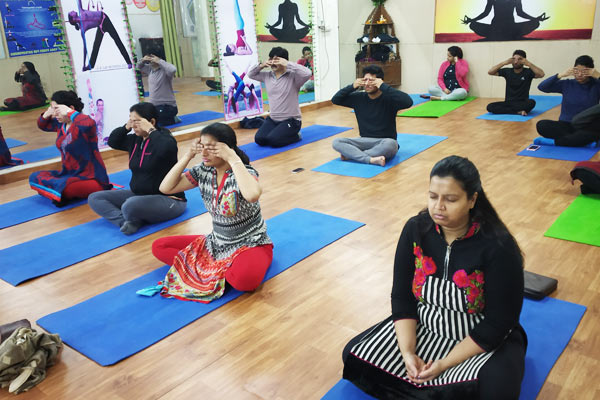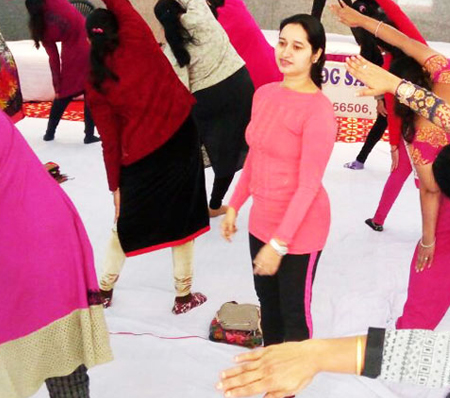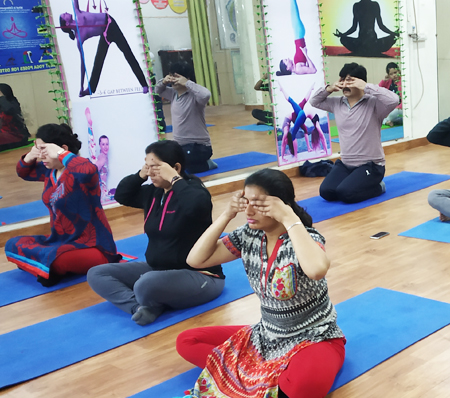
Teacher Training Course
Yoga, as a way of living aims towards healthy mind receding in a healthy body. Yoga is beneficiary in all mental, spiritual, social and physical aspect of a self. With the aim of improving balance, flexibility, coordination, strength and endurance, the training course focuses in curtailing the ailment in the natural way.
At Anubhuti Yog, our intention is to apply the science of Yoga for character building and for overall complete development through teacher training program. This training program focuses in teaching techniques to bring change in experiencing and understanding the magical effects of yoga.Trainers emphasizeon the therapeutic approach to yoga by using their own body and asana practice. The USP of Anubhuti Yog is theteaching of advanced techniques of yoga bringing immediate relief to any aliment which is hardly taught in public classes or any general workshops. In addition, they will also explore and experience transformational practices such as Pranayama, Mantra, Mudra, Yog Nidra, and Meditation.
Along with teaching the course, skills to handle and transfer the knowledge are developed, Placement after completion of course are also assisted. Classes at Anubhuti are crafted to provide hands on experience, helps in setup their own practice. Internship of 2 months is the part of the course.
Expert faculty in Yog, Psychology, Anaotomy & physiology , disease oriented Yog Therapy. After rigorous theory class, practical sessions are also the part of the teacher training course for clarity of concepts.
Expert Course Co-odinators
Acharya Deepchand kaushik:
Diploma in yog science from SRM international institute of yoga under the guidance of Swami Devi dayal ji Maharaj in 1984. Having 35 years of experience, Post graduate in Public Administration ,and a qualified civil engineer.MA in yog Science.
Shilpi Gupta:
MBA, B.Ed, M.A. (Yoga) N.D.D.Y, D.N.H.E, CCY (Morarji Desai). She has an experience of 12 years in the field of yoga therapy and also worked with Govt. sectors. Her specialization in pregnancy yoga.
Shafiq Ansar:
M.A. (Yoga), N.D.D.Y, B.Lib He has 12 years experience as fitness trainer. He has trained models, celebrities, diplomats, actors and corporate executives. His specialization in power yoga & weight management.
Other Faculty
Vijender Singh( faculty of yoga history):
M.Sc. (Yoga), N.D.D.Y, GSPCS He has 15 years of experience as yoga and Neurotherapy. Having vast knowledge in Puranas, Upnishads, Bhagwad Gita and complete Yoga history.
Umesh Kaushik( faculty of psychology ) :
B.Sc, M.A in psychology A certified Yoga and Naturotherapist, Reiki master and Reiki practitioner. His specialization is in human psychology.
Naveen (faculty of anatomy) :
B.Sc, B.P.Ed. He has 6 years of experience as yoga instructor. he got a lots of championship at Zonal ,State & National Level. His specialization is in Yogic anatomy and physiology.
Dinesh Gupta ( training & development manager in pharmaceutical industry ):
B.Sc, LLB, MBA professional trainer with 25 years experience of medical training with pharmaceutical companies.
YOGA TEACHERS TRAINING PROGRAMME
Introduction to Yoga and Yogic practices
- Etymology of Yoga and definitions of Yoga in different Classical Yoga texts
- Brief introduction to origin, history and development of Yoga
- Aim, Objectives and Misconceptions about Yoga
- General Introduction to Shad-darshanas with special reference to Sankhya and Yoga
- General introduction to four paths of Yoga
- Principles of Yoga and Yogic practices
- Guidelines for Instructors
Introduction to Hatha Yoga
- Distinction between Yoga Asana and Non-Yogic physical practices
- Introduction to important Hatha Yoga Texts with special reference to Hatha Yoga – Pradipika and Gheranda Samhita
- Concept of Yogic Diet
- Causes of Success (SadhakaTattwa) and Causes of Failure (Badhaka Tattwa) in – Hatha Yoga Sadhana
- Concept of Ghata and Ghata Shudhhi in Hatha Yoga
- Purpose and utility of Shat-kriya Hatha Yoga
- Purpose and utility of Asana in Hatha Yoga
- Purpose and importance of Pranayama in Hatha Yoga
Introducton to Patanjali
- Definition, nature and aim of Yoga according to Patanjali
- Concept of Chitta and Chitta Bhumis
- Chitta-vrittis and Chitta-vrittinirodhopaya (Abhyasa and Vairagya)
- Concept of Ishwara and Ishwara Pranidhana
- Chitta Vikshepas (Antarayas) and their associates (Sahabhuva)
- Concept of Chitta Prasadana and their relevance in mental well being
- Kleshas and their significance in Yoga
- Ashtanga Yoga of Patanjali : its purpose and effects, its significance
Introduction to human systems, yoga and health
- The nine systems of human body
- Functions of different systems of human body
- Introduction to Sensory Organs
- Neuromuscular co-ordination of Sensory Organs
- Basic understanding of Exercise Physiology
- Homeostasis
- The benefits of various asana on different parts of the human body
- The limitations and contra-indications of specific Yoga practices
Yoga for wellness- Prevention and Promotion of Positive Health
- Health, its meaning and definitions
- Yogic conceptions of health and diseases
- Concept of Pancha kosha
- Concept of Triguna
- Concept of Panchamahabhutas
- Yogic principles of Healthy-Living
- Introduction to yogic diet and nutrition
Yoga And Stress Management
- Human Psyche: Yogic and modern concepts, Behavior and Consciousness
- Frustration, Conflicts, and Psychosomatic disordersy
- Relationship between Mind and Body
- Mental Hygiene and Roll of Yoga in Mental Hygiene
- Mental health: a Yogic perspective
- Prayer and meditation for mental health
- Psycho-social environment and its importance for mental health (yama, and niyama)
- Concept of stress according to modern science and Yoga
- Role of Yoga in Stress management
- Role of Yoga for Life management
SYLLABUS BOOK
AYS YOGA Teachers Training Manual
Other Recommended Books
- Bhartiya Darshan by Prof. Baldev Upadhayay.
- Sankhyakarika by Dr. Bejnath Pandey
- Yog Darshan by Harikrishan Das Goyanka
- Hath Yog Pradipika by Ram Lal Shrivastava
- Yogic sukshm Viyayam by Dhirender Brahmchari
- Sidh Sidhant Padhti of Gorakshanath Published by Lonavla
- Anatomy and Physiology by Mohan and Chatterjee
FEES STRUCTURE
Fee for 200 hrs Yoga Teacher Training Programme
Rs.200/- Prospectus Fee
Rs.20,000/- fees + QCI exam fees for full course ( Including study materials and examination fee).
- 500 USD (Non-residential) NRIs
- 750 USD (Residential with twin sharing bases)
- 1500 USD (Residential non-sharing AC room)
Rules and Regulation
- Certificate will be awarded only after passing the exam with atleast 75% attendance.
- Fee once paid will not be refunded and transferred.
- The decision of course coordinators will be final and binding on all persons concerned in all matters including change in rules and regulations regarding course, examination and results.
- Reach the centre at least 10 minutes before the class is scheduled to start.
- Keep your mobile switched off unless there is an emergency.
- Students are responsible for their medical and health care.
- Students are requested to maintain a yogic atmosphere of sincerity and positivity.
Speciality
- The class room session will provide an opportunity to have command of yoga and confidence.
- Students who want to continue regular classes after the course is over will be given a discount.
- Placement will be given to yoga teachers after successful completion the course. (condition applied)
- You must complete the course in stipulated time.
- Support will be given for those who want to start their own yoga studio.






